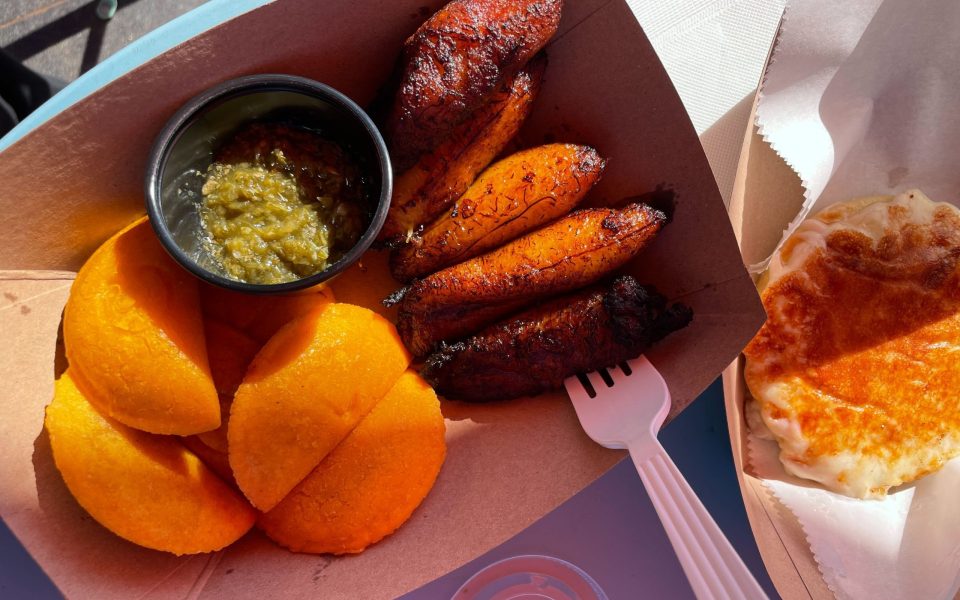Featured photo: Mo’Empanadas started in 2022 after co-owner Mike Ortegon got tired of working in corporate America. (photo by Kaitlynn Havens.)
The comforting smell of sazón seasoning coats Bailey Park, the acre of downtown Winston-Salem with its industrial brick meeting spaces, the nearby buses of Wake Forest employees and students and the concrete amphitheater atop a well-kept grassy knoll. The evocative scent summons residents of downtown. It’s coupled with wafts of flat-top melted cheese, but there’s something unfamiliar, something sweet and savory, rich and hearty. At the top of the park’s grassy expanse sits a black food truck, punctuated with letters of bright yellow, cerulean blue and crimson red. The truck is dotted with what looks like golden half crescent moons and belongs to Michael Ortegon, the colors representing his Colombian ancestry. The scent that brings life to the wintery temperatures comes from those golden crescent pockets that cultures across the world find comfort in: the empanada.

Mike Ortegon started his mobile food business, Mo’Empandas, in 2022, with his sister Karen Ruiz as business manager, after grappling with several careers in a pandemic-recovering world.
“We started just doing pop-ups with a tent and a little fryer on a table,” Ortegon says of the early days of Mo’Empanadas. “I was just trying to figure out what to do as far as life. I didn’t want to work for a corporation anymore.”
Ortegon graduated in 2011 from the culinary program at the Art Institute of Raleigh-Durham, but found himself consistently working in avenues he wasn’t passionate about.
“I was working asset protection at Ralph Lauren and they would bring food trucks out,” Ortegon explains. “I went up to the first food truck and was like, ‘Man, you’re living my dream.’ I think he thought I was messing with him, but I was so honest. This is what I wanted to do.”
As children of Colombian natives, Mike and his sister grew up eating their mom’s empanadas.
“We grew up in New Jersey; if my mom wasn’t making empanadas, we could go to any Colombian bakery in the state and get them,” he says.
It was with inspiration from his mom’s recipe, along with help and encouragement from his family, that Ortegon renewed his love of the pockets of yellow-corn dough stuffed with seasoned meats and potatoes. A classic Colombian empanada is deep fried to a crispy, flakey outside and a hot creamy inside.
“The recipes for our beef and chicken empanadas are tweaked a little, but we stay true to mom’s recipe and to authentic Colombian styles,” Ortegon says. “We stuff ours a little full; I like mine with a lot of stuffing! It isn’t my mom’s way of doing it, but it’s how I like mine, and people seem to really like that.”
Apart from overstuffed empanadas, Mo’Empanada’s menu also includes mini empanadas, arepas, plantains, and a fan favorite, their vegan empanada.
“Empanadas are already gluten free, so we wanted to offer another health-conscious option. I wanted to do a vegan empanada but for the life of me could not figure out what to fill it with,” Ortegon recalls. “My sister recommended lentils, and I thought, Man, I really do love some lentils.”
Their vegan empanada is made with the same corn-flour dough, but comes stuffed with a savory and spiced filling of lentils, carrots, onions and, of course, potatoes. It is fried the same way the beef and chicken empanadas are, but stamped with a blocked-letter, “V.”
“People are always asking for the mini empanadas so they can sample each one, and I’ve never had anyone not shocked at how good the vegan is,” Ortegon smiles.
Paired with sweet plantains that can be sprinkled with cheese upon customer request, the mini empanadas are a meal of their own. The plantain’s sweetness and slightly crispy outside are the perfect bite between the bold spices melted into each empanada filling. Each meal comes with a side of ají, a green cilantro pepper sauce that is, quite frankly, good enough to drink out of a bottle.
“People love that sauce,” Ortegon laughs when asked for more. “We serve it in small amounts because we didn’t want it to go to waste. But I’ve seen people come close to licking it out of the container.”
Ortegon cares about waste. So much so that he’s working with the Piedmont Environmental Alliance on becoming the Triad’s first “no-waste” mobile-food business.
“We are moving to compostable forks and recyclable containers. But I’m really excited about getting solar energy to the truck,” Ortegon explains.
Adding a solar panel to the top of their food truck would not only be a cost-effective way to increase their availability — food trucks often need a specific electric socket in order to park in a vendors lot — it would also provide an eco-conscious alternative energy source to both power outlets as well as high pollutant fuel-run generators.
“My family and my community mean so much to us,” Ortegon says, “I want to leave the world a better place. But while I’m here, I want people to experience Colombian food. To experience my culture. I want Colombian natives to eat my empanadas and say, ‘Man, this reminds me of home.’ And I want people that have never had it, or have had other kinds of empanadas, to come back for more.”
Follow Mo’Empanadas on Instagram at @mo_empanadas for location and schedule.
Join the First Amendment Society, a membership that goes directly to funding TCB‘s newsroom.
We believe that reporting can save the world.
The TCB First Amendment Society recognizes the vital role of a free, unfettered press with a bundling of local experiences designed to build community, and unique engagements with our newsroom that will help you understand, and shape, local journalism’s critical role in uplifting the people in our cities.
All revenue goes directly into the newsroom as reporters’ salaries and freelance commissions.


Leave a Reply